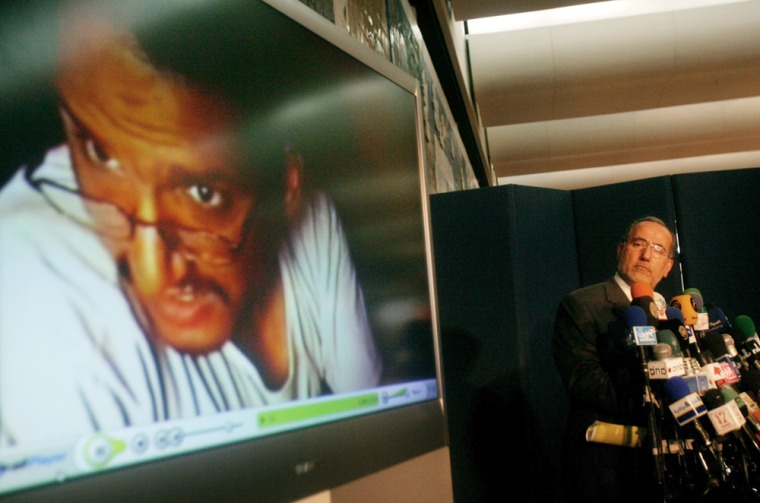Security forces are closing in on the leader of al-Qaida in Iraq, a senior Iraqi official said Sunday, showing a captured video of the terror chief teaching followers how to build a car bomb.
The video, displayed to journalists, showed Abu Ayyub al-Masri — his face exposed — going through what appeared to be a storage bunker, pointing out different elements of a car bomb in what National Security Adviser Mouwafak al-Rubaie called an instructional CD.
“In a very short time, we will bring you the good news of Abu Ayyub al-Masri either killed or handcuffed to be brought before the Iraqi justice system,” al-Rubaie said, then added, addressing al-Masri, “Your days are numbered and you will face your fate very soon.”
The U.S. military said Sunday that more than 20 terror suspects believed linked to al-Qaida in Iraq had been killed or captured in raids in the past week in Baghdad and the nearby cities of Baqouba, Ramadi and Samarra.
A woman and a girl died in a crossfire during a raid by Iraqi troops, backed by American advisers, early Sunday on a suspected militia member’s home in the Shiite neighborhood of Sadr City, a stronghold of the Mahdi Army militia, Iraqi security officials said. The militiaman, suspected of involvement in kidnap-slayings, was captured.
Later Sunday, gunmen kidnapped 26 workers from a refrigerated food factory in western Baghdad in what appeared to be a new sectarian attack, a security official said.
The kidnapped workers included Shiites and Sunnis, and among them were three women, Col. Abdul-Karim Khalaf told the Associated Press.
Khalaf said the identity of the kidnappers or their sect was not known.
Satirical religious image stirs controversy
Angry men at the scene held up a color image of a smiling, winking Jesus giving a “thumbs up” sign that they said was left by troops at the raided house. The image, known as the “Buddy Christ,” is from the movie Dogma, a 1999 religious satire.
“We are poor people sitting in our house,” a woman dressed in black told Associated Press Television News in the aftermath of the raid. “We don’t harbor rancor against others.”
U.S. military spokesman Lt. Col. Barry Johnson said the photo was a “rather ridiculous attempt to discredit a raid conducted by Iraqi forces who captured a suspected murderer and kidnapper.”
Maj. Salman Abdel-Wahid, a spokesman for the Iraqi army’s 6th Division in Baghdad, said his soldiers could not have been responsible for the picture.
“Our soldiers do not carry out such acts,” he said.
The raid came a day after an unprecedented curfew in the Iraqi capital prompted by the arrest of an al-Qaida suspect who the U.S. military said was “in the final stages” of carrying out a string of bombings in Baghdad’s fortified Green Zone, the center of government.
The suspect, seized Friday night, was the bodyguard of a top Sunni Arab politician, Adnan Al-Dulaimi, a member of the Iraqi Accordance Front — the largest Sunni coalition in the 275-member parliament.
Baha el-Deen al-Araji, a Shiite lawmaker, accused Sunni politicians of having “direct and indirect links to Saddamists, Takfiris (Sunni radicals) and terrorists.”
He demanded a “significant cabinet reshuffle” to change “ministries of security and public services dossiers” — referring to the Defense Ministry and other posts held by Accordance Front supporters.
Al-Dulaimi denied any connection to militants and accused critics of trying to harm national unity.
A lawmaker from al-Dulaimi’s party, Harith al-Obeidi, accused Shiites of trying to “defame the bloc because of our principled stances against the (Shiite) militias who are playing havoc throughout the country.”
Fresh violence plagues Baghdad
With the end of the curfew Sunday morning, new violence killed at least 22 people in Baghdad and elsewhere — including the two who died in Sunday’s raid — and eight bodies were found, apparently the latest victims of sectarian violence between Sunni and Shiite death squads.
Among the dead were three Iraqi civilians killed by a car bomb targeting a U.S. military patrol in Baghdad. Another car bomb went off in the western city of Fallujah, killing three people inside and two bystanders.
The U.S. military also announced that two American soldiers were killed Saturday in western Anbar province.
Al-Rubaie did not say why he believed security forces were close to catching al-Masri, who was named as leader of Iraq’s most feared terror group after the death of his predecessor, Abu Musab al-Zarqawi, in a June airstrike by U.S. forces. The U.S. military did not immediately respond to requests for comment on the video.
The al-Masri video was found in a raid a few days ago in Youssifiyah, 12 miles south of Baghdad, and copies of it have been distributed to al-Qaida followers, al-Rubaie said.
“He is copying this video for distribution to the killers and criminals to spread murder and sabotage among Iraqis,” al-Rubaie said.
Al-Masri shows face on tape
It was the first time al-Masri — also known by the pseudonym Abu Hamza al-Muhajer — has appeared showing his face in a video, though U.S. and Iraqi military officials have shown photos of him.
In the video, al-Masri, wearing a white T-shirt, talks to the camera as he points out tin boxes and coils of wire and describes how to put together a vehicle bomb.
“We prepare this vehicle as we did with other vehicles in the past,” al-Masri says at one point. The militant, believed to be Egyptian-born, wore glasses and had short hair and a mustache but no beard.
Al-Rubaie said the government was releasing the footage to “let Iraqis know who is their No. 1 enemy ... recognize him easily and make it hard for him to hide.”
